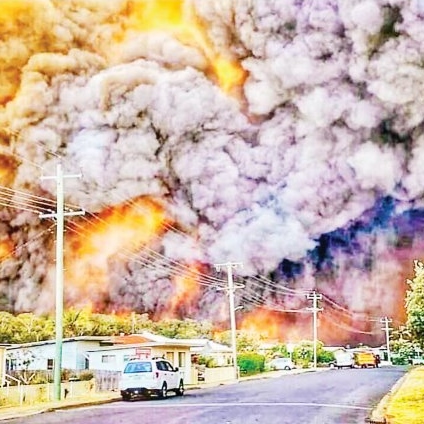
Featured Item

Community on high alert as Sydney faces ‘catastrophic fire’
TALI FEINBERG
Alhadeff spoke to the SA Jewish Report this week from the east coast of Australia, where more than 130 wildfires are burning and the greater Sydney area faces a “catastrophic fire danger” for the first time. He said another Jewish family in the same area had been badly affected by smoke. His organisation has started a crowdfunding initiative to raise money for the bushfire victims.
Alhadeff explained that the Sydney suburb of St Ives has many expat South African Jewish families, and they are nervous because of fires threatening the next-door suburb of Turramurra. “In addition, if you fly over St Ives, it looks like bushland. It’s very green and dense with trees, and it has a major nature reserve in the middle of it, so that is a flashpoint for fires. While people there have not been ordered to evacuate, they are concerned and anxious.”
According to Australia’s fire-rating system, “catastrophic” means “for your survival, leaving early is the only option”. It instructs residents to “leave bushfire-prone areas the night before or early in the day – do not just wait and see what happens. Make a decision about when you will leave and where you will go, how you will get there and when you will return. Homes are not designed to withstand fires in catastrophic conditions, so you should leave early.”
More than 100 000 homes are at risk over the coming days as a combination of drought, heat and blustery winds bears down on NSW, the country’s most populated state, reported the New York Times.
“The conditions are expected to get worse,” Shane Fitzsimmons, the Rural Fire Service commissioner, said on Tuesday afternoon in Sydney. “Complacency kills,” he added. “We cannot afford to be complacent.”
The fires, which began burning last weekend, have caused four deaths and destroyed more than 150 properties, with more going up in flames every few hours. Maps for the areas likely to burn show blazes potentially doubling in size, with Coffs Harbour, a coastal city of 70 000 people, looking especially vulnerable, along with Sydney’s outer suburbs.
“Everybody has to be on alert, no matter where you are, and everybody has to assume the worst. We cannot allow complacency to creep in,” NSW premier Gladys Berejiklian told reporters in Sydney, according to Reuters.
Alhadeff said there is a chance that the fires were started deliberately, but they also could have occurred because of drought and heat. This is highly concerning as it is not even summer yet and the country is expecting a hotter, drier season ahead. “So it’s all too easy for a bushfire to erupt,” he said. “These conditions are an urgent crisis.”
He said he had just received a call from a group of 15 Israeli firefighters, who are ready to fly out to offer their expertise in both firefighting and post-fire work. However, they would need thousands of dollars for flights, accommodation and equipment. At this stage, those in authority told Alhadeff, things are under control, although the offer is appreciated.
Hilary Coleman, formerly of Johannesburg and now living in Sydney, says when she moved to the city 20 years ago, she found bushfire season to be a scary reality of life in Australia. This week, she was grateful to “have escaped the horror of this catastrophic and unprecedented event, but seriously, the north shore of Sydney is carved out of bushland. We have had to download the app of the Rural Fire Services, Fires Near Me. Everyone was instructed to have a bag ready to take with in case of evacuations – passport, important documents, photos and jewellery. These situations turn at the drop of a hat and you are faced with walls of flames,” said Coleman.
“Hundreds of schools that backed onto bushland were closed today [Tuesday, 12 November]. My grandson’s school wasn’t closed, but we were on alert in case things changed. These are all schools right in all the streets around me. There have been house fires in the suburb right next to me, a three-minute drive from me, where blowing embers caught the roof. This has been totally catastrophic. I am devastated for those who have lost loved ones, their homes, their farms, their livelihoods. And, oh my G-d, the loss of wildlife, especially the koala bears, is just incalculable,” she said.




